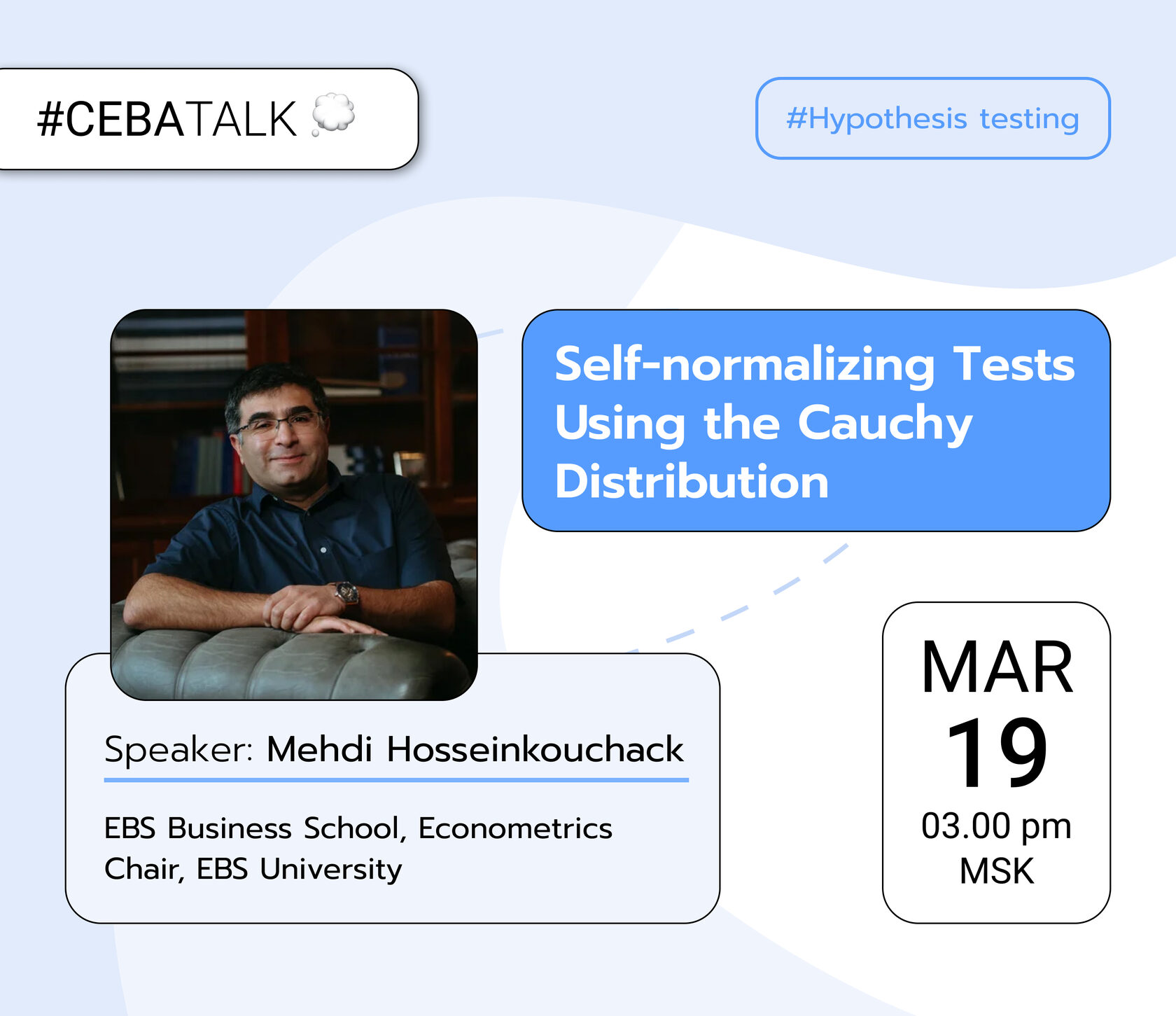Time: 19th March (Tuesday) 15.00 Moscow time
Speaker: Mehdi Hosseinkouchack (EBS Business School, Econometrics Chair, EBS University)
Title: Self-normalizing Tests Using the Cauchy Distribution
Field of study
"Hypothesis testing"
What problem is your research intended to solve?
"Using test statistics often require the estimation of a scaling parameter which is hard to estimate. The distribution of the test statistics are often not standard. Our approach gets around these two issues; this is not a free lunch and comes with power loss, however."
What did your research find?
"It is possible to test for a simple hypothesis without too much worry about the specific form of intertemporal dependence in univariate time series as well as cross-dependence in a multivariate time-series framework."
Abstract: A testing principle is introduced where the statistic is the ratio of two weighted averages. Upon normalization and orthogonalization the ratio thus converges to the standard Cauchy distribution under the null hypothesis. At the same time a potential nuisance scaling parameter cancels from the ratio without having to be estimated, making these Cauchy tests self-normalizing (scale-invariant). These tests are not directed against specific alternatives but rather belong to the toolkit of general specification testing. Still, assuming specific local alternatives, asymptotic power can be determined since the ratio converges to a non-centered Cauchy distribution. Power crucially hinges on the weighting scheme when computing the weighted averages. We discuss three examples: tests for a Wiener process, for a Brownian bridge, and under long memory. Simulations show that the asymptotic scale-invariance is effective in finite samples, and the Cauchy test has better size control than competing procedures. This comes at the price that the Cauchy test is less powerful than competitors directed against specific alternatives. Finally, we indicate how Cauchy tests can be extended to a multivariate framework of correlated samples, such that the tests are robust with respect to cross-dependence without need to explicitly account for it.
More information, a link to the research and the upcoming seminar here.
We are looking forward to seeing you!
Speaker: Mehdi Hosseinkouchack (EBS Business School, Econometrics Chair, EBS University)
Title: Self-normalizing Tests Using the Cauchy Distribution
Field of study
"Hypothesis testing"
What problem is your research intended to solve?
"Using test statistics often require the estimation of a scaling parameter which is hard to estimate. The distribution of the test statistics are often not standard. Our approach gets around these two issues; this is not a free lunch and comes with power loss, however."
What did your research find?
"It is possible to test for a simple hypothesis without too much worry about the specific form of intertemporal dependence in univariate time series as well as cross-dependence in a multivariate time-series framework."
Abstract: A testing principle is introduced where the statistic is the ratio of two weighted averages. Upon normalization and orthogonalization the ratio thus converges to the standard Cauchy distribution under the null hypothesis. At the same time a potential nuisance scaling parameter cancels from the ratio without having to be estimated, making these Cauchy tests self-normalizing (scale-invariant). These tests are not directed against specific alternatives but rather belong to the toolkit of general specification testing. Still, assuming specific local alternatives, asymptotic power can be determined since the ratio converges to a non-centered Cauchy distribution. Power crucially hinges on the weighting scheme when computing the weighted averages. We discuss three examples: tests for a Wiener process, for a Brownian bridge, and under long memory. Simulations show that the asymptotic scale-invariance is effective in finite samples, and the Cauchy test has better size control than competing procedures. This comes at the price that the Cauchy test is less powerful than competitors directed against specific alternatives. Finally, we indicate how Cauchy tests can be extended to a multivariate framework of correlated samples, such that the tests are robust with respect to cross-dependence without need to explicitly account for it.
More information, a link to the research and the upcoming seminar here.
We are looking forward to seeing you!
